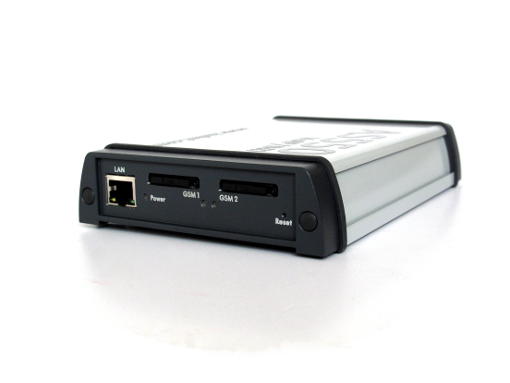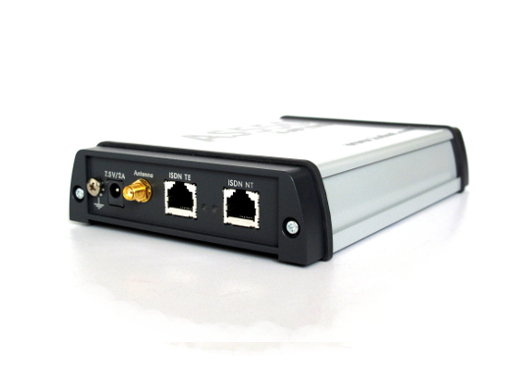2-channel GSM – VoIP – BRI gateway
AS550, what it is good for? e.g.
… because there is no landline connection.
… because the existing fixed line connection is permanently broken.
… because a fixed line connection is not required at all.
… because the existing fixed network connection is not reliable.
… from the basic security considerations to have a backup connection.
By connecting a telephone system directly to the mobile phone network, the AS550 improves the operational security of the communication and the accessibility of a company. For this purpose, the AS550 is either connected between the trunk line and the telephone system ‘PassThrough‘ * or as an additional full line replacement. It can replace an ISDN NTBA or 2 VoIP lines.
Software modules, in the form of so – called ‘Extended Features‘, such as the Telnet control, the SNMP module or a Short-message-API etc. expand the range of use.
All optional software modules can also be used by a free 28-day Test License.
* ‘PassThrough’ is only available on the ISDN (BRI) port
Functional overview
| Interfaces | - 2 Quad-band radio modules for EGSM 900/GSM 1800 (optional quad-band) - Integrated antenna splitting - Basic Rate Interface S0 point-to-point or S0 point-to-multipoint TE or NT simulation - S0 clock synchronisation resp. PassThrough - 10/100 Base-T Ethernet LAN for VoIP using SIP-protocol |
| Functional overview | - Direct call can be defined individually for each radio channel - Assignment of the radio channels by groups - Call back unrestricted, limited by Blacklist, Whitelist or DTMF code - Storing answered and unanswered calls - The link extension call number is called mobile subscriber is stored in the device and is used for the call back. - Callback request via SMS short message - Very fast connection setup PBX to mobile radio - Full dial-up capability - GSM to ISDN/IP number display (CLIP) - Relocation from mobile to fixed with GME * (optional) - SMS short messages via TELNET * or short news API * * With a software module (optional) |
| Configuration setups | - Causes (ISDN causes) are adjustable - Built-in LCR functions, routing tables for destination and source call numbers - Possibility of blocking certain numbers or prefixes - Adjustable phone number display GSM > ISDN/IP (CLIP) - GSM minimum signal quality for connection setup - Direct call per external GSM subscriber adjustable GSM > ISDN/IP (CLIP) etc. |
| Maintenance | PC configuration software for Microsoft Windows© 9x/NT/2000/XP/VISTA/Windows 7,8,10 - Remote configuration and maintenance via LAN ReverseIP or GSM data channel - Configuration and maintenance during operation - Firmware update via LAN or via GSM data channel - Operating status display via LEDs - Troubleshooting by local or remote recording of traces which can be stored in text or Wireshark© format. - Monitoring via SNMP * * With a software module (optional) |
Technical Data
| Radio module | Cinterion BGS2-E* GSM dual-band modem Class 4 (2W) for GSM900 Class 1 (1W) for GSM1800 Conform to GSM phase 2/2+ GPRS multi-slot Class 10 *(optional BGS2-W quad-band) |
| Programming- interface | LAN-network, ReverseIP or GSM cs-data |
| Power supply | Coaxial power connector for wall power supply: DC 7,5- 30 V / max. 1A |
| ISDN interface TE | S0 subscriber terminal or S0 tie line |
| ISDN interface NT | S0 NT simulation with DSS1 |
| ISDN protocols | DSS1 or QSIG protocol |
| IP - interface | RJ 45 Ethernet 10/100 Base-T SIP 2.0 / UDP as Server, Client or Peer-To-Peer Additional Protocols: ARP, DHCP, DNS, STUN, VLAN, SNMP Codec: G.711 µ-law, G.711 a-law Authentification: MD5 |
| Data and SMS services | by TELNET with a software add-on (optional) |
| Shortmessage (SMS) | by TELNET or API software add-on (optional) |
| Antenna | 1 antenna splitter/combiner 2 x 1 SMA female |
| Size | approx. W 153mm x H 35mm x D 185 mm |
| Weight | approx. 750 Gramm |
| Power consumption | min. 3W / max. 6 W |
| Work environment | Operating temperature range: 5°C to 40°C Storage temperature range: -10°C to 70°C Humidity range: 0% to 90% |
| Subject to modifications! | |


